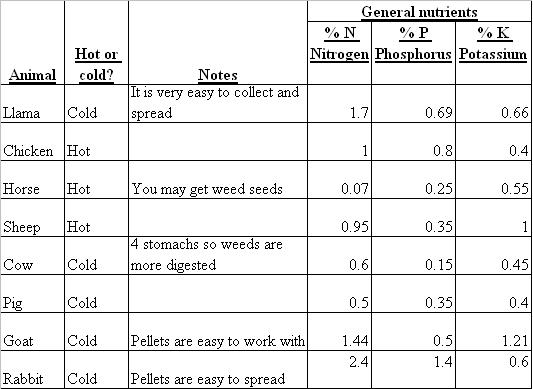We have 10 llamas and use their manure as a fall garden mulch along with leaves and other vegetative matter. Llamas create large manure piles, which makes gathering their pellets easy.
I am not a manure expert. What follows below is information about manure that I have gleaned from my books and the Internet. I have included some links so you can do more research. This is a topic that should be thoroughly researched due to the risks to human health.
Manure is a valuable soil amendment for your garden. Manure has the all-important NPK, but even more importantly, it is organic matter that provides soil conditioning.
Under certain circumstances manure can be applied directly to the garden. But it is better to create manure compost. There are two reasons not to use manure directly on the garden. One is for the safety of your plants and the other is for the safety of your health.
Human Health
The experts say that crops should not be harvested before manure has had a chance to age. Manure should be at least 120 days old before root crops are harvested, and at least 90 days for above ground crops. I put manure on the previous fall just to make sure it’s had plenty of time. There are many who won’t put manure on that’s less than a year old.
Here is link to more information about manure fertilizer and your edible crops.
Plant Health
One should proceed with caution when putting manure on directly on the garden. There are two reasons to consider the option carefully:
* Hot manures have a high nitrogen content, and will burn plants when it hasn’t had time to age. However many manures are “cold” and can be applied immediately. See table below.
* Then there are those who say that manure should only be added to your compost pile, because manure decomposing will deplete the nitrogen in your soil. The nitrogen then won’t be available for your plants. Organic nitrogen fertilizer supplementation may be necessary (fish fertilizer and blood meal are two sources.)
Heat composting will kill pathogens and weeds seeds. This means heating your pile to 140 degrees F. In this case, manures that are hot (chicken manure, horse manure, and sheep manure) do not need to be aged as long as the recommended times.
With a pile that doesn’t heat up, “Smell will tell.” Manure composting is considered “finished” aging when it finally smells like fresh soil; like the smell of a forest floor after a spring rain. In my experience, this will take up to a year.
Here is a table with some general characteristics of different animal manures.
Please note that the NPK values shown above are estimates and averages. The nutrition in the manure differs with the kinds of food that the animals eat, the age of the animal, and the health of the animals. The more nutrients in the animal’s food, the more nutrients there will be in the manure. Animals that are feed on wheat bran, gluten meal and cottonseed meal will produce manure that has higher nutrients compared to animals that are feed on hay and straws and no grains. Young animals that are growing up and still developing their bones and muscles will produce manure that is poorer in nutrients compared to the mature animals.
Here are more links to information about manure:

